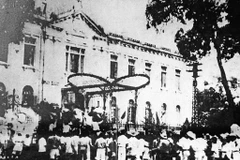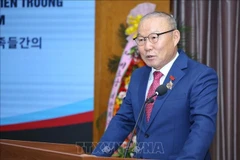HCM City (VNA) - Ho Chi Minh City, boasting a vibrant cultural landscape and dynamic film industry, stands at a crossroads to transform itself into a regional and international film hub.
The city currently hosts over 100 film production and distribution units alongside more than 800 film businesses. It boasts a passionate cohort of young, dynamic producers and filmmakers who stay attuned to global cinema trends, many of whom received their education abroad.
Beyond being the nation's production and distribution hub, the city is an important market for film screening as it houses 56 cinema complexes that attracts the country's largest movie goers, accounting for 40% of Vietnam's total market share. This robust performance has helped position Vietnam as Southeast Asia's second-largest box office market.
However, the city’s path to becoming a global film centre faces significant hurdles.
According to Meritorious Artist Le Thien, independent filmmakers often struggle with calling for funding and accessing international market. Besides, local film infrastructure, including modern studios, post-production facilities and digital services, still fails to meet requirements of large-scale projects. Issues with copyright protection and enforcement further hamper creative development.
Director and producer Mai The Hiep pointed his finger to the city's weak film ecosystem, laying stress on the absence of standard and large-scale studios. He said current facilities are largely converted from warehouses and limited to indoor filming.
Referring to his field trip to Shanghai, Hiep said the Chinese city has studios for both indoor and outdoor sets, along with accommodations for supporting actors and extras, creating a more efficient production environment.
Nguyen Thi Thanh Thuy, Deputy Director of Ho Chi Minh City's Department of Culture and Sports, acknowledges the industry’s challenges, including shortages of professionals with management and business skills and limited adoption of digital technology.
Although a film production supporting fund was established under the Law on Cinematography, implementation guidelines remain unclear, she said.
Industry experts said transforming HCM City into a “cinema city” requires more than just capital mobilisation, infrastructure development, and completion of related regulations.
Director Nhat Trung held that the biggest challenge of the industry is to develop international-standard human resources. In the same vein, Director Vo Thanh Hoa suggested following the Republic of Korea’s model of investing in talent development through intensive training in foreign countries to develop the homeland’s culture and arts, as well as supporting filmmakers to attend film festivals and conferences to improve production vision and creativity.
Dr. Truong Minh Huy Vu, Director of the Ho Chi Minh City Institute for Development Studies, said the city is envisaged to become a creative city of film by 2025 under a decision from the Ministry of Culture, Sports and Tourism. Against the backdrop, the city should sketch out plans and make application to the UNESCO Creative Cities Network.
Focus should be channeled into human resources training and attraction across all aspects of filmmaking, from creativity roles, directors, actors to business operators, he added./.




























